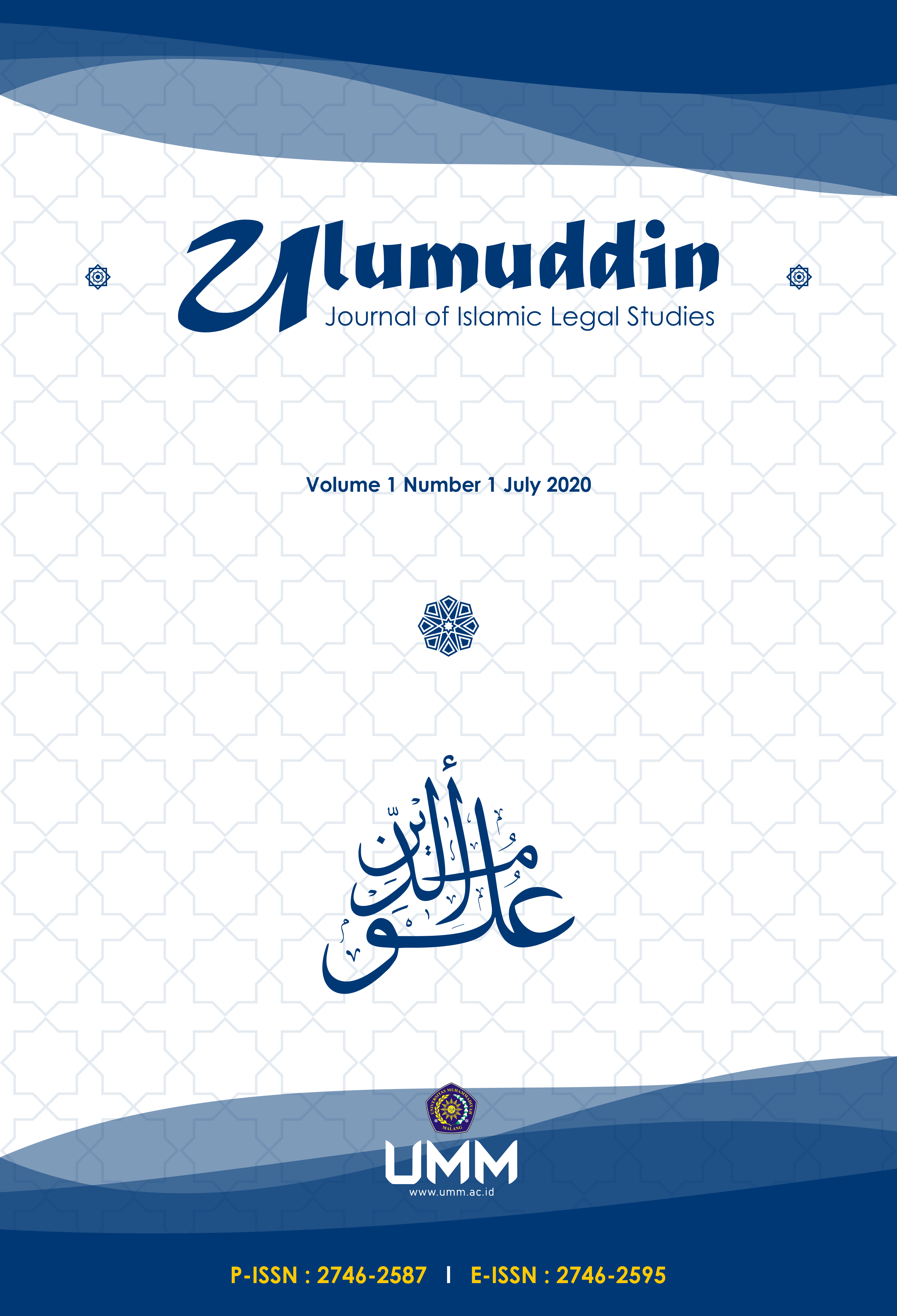The Significant and Arguments for the Renewal of Maqāṣid al-Sharī‘ah
DOI:
https://doi.org/10.22219/ulumuddin.v1i1.12723Keywords:
Maqāṣid al-sharī’ah, maqāṣidi approach, the renewal of maqāṣid, legal-formal interpretation, textualism, Islamic thought, environmental degradation.Abstract
The phenomenon of massive industrialisation has caused a number of critical and complex issues in social, cultural and ecological sectors. The most obvious one has been environmental degradation which is also related to the problem of entrenched ignorance. This certainly requires Muslims to immediately come up with solutions to these problems within the framework of Islamic thought. Unfortunately, Muslims have been considered inept and slow. Indeed, the orientation of thought in the Islamic world has been thus far dominated by the power of textualism, namely legal-formal interpretation with the dominance of linguistic approach. This article aims to critically diagnose and evaluate the problem of domination of the Islamic legal interpretation, especially in context of the conceptualisation of maqāṣid al-sharī‘ah. It is essential, since Muslim scholars initially have deemed maqāṣid al-sharī‘ah as a suitable solution to overcome textualism, yet it is still restrained by the supremacy of textualism. Consequently, its function is limited to mere method of legislation. Studies on maqāṣid textualism in the context of environmental degradation are non-existent. In order to fill the gap of this study, this article argues that maqāṣid al-sharī‘ah must be transformed. The main reason in supporting this argument is that maqāṣid al-sharī‘ah is an intellectual and historical product which is open to reconstruction. In addition, as an axiological discourse, it continuously evolves. Thus, this shows that the profane nature of maqāṣid al-sharī‘ah seems not immune to change
Downloads
References
Abdullah, Ahmad Badri. “An Analysis of Islamic Jurisprudence (Fiqh) as Applied Islamic Ethics.” Journal of Islamic Civilisational Renewal 5, no. 2 (2014): 183-203
Asyur, Ibnu. The Treatise of Maqāsid. Translated by Mohamed El-Tahir El-Mesawi. London: The International Institute of Islamic Thought, 2006.
Auda, Jasser. “Realizing Maqasid in the Shari’ah.” In The Objectives of Islamic Law: The Promises and Challenges of the Maqasid al-Shari’a, edited by Idris Nassery, 35-56. London: Lexington Books, 2018.
Auda, Jasser. “What is Maqashid.” Jasser Auda. Accessed Januari 30, 2020. https://www.youtube.com/watch?v=ho5AiCBRoX8
Auda, Jasser. Maqasid Untuk Pemula. Translated by Ali Abdelmon’im. Yogyakarta: SUKA-Press, 2013.
Auda, Jasser. Membumikan Hukum Islam Melalui Maqasid Syari’ah. Translated by Rosidin dan Ali Abd. El-Mun’im. Bandung: Mizan, 2015.
Bernie, Muhammad. “MUI Bandung Buat Fatwa Sterilkan Masjid dari Pengungsi Tamansari.” Tirto.id Report. Accessed Januari 28, 2020. https://tirto.id/mui-bandung-buat-fatwa-sterilkan-masjid-dari-pengungsi-tamansari-etEe
Al-Bukhari. Al-Sahih al-Bukhari vol. 1, edited by Mustafa al-Buga. Beirut: Dar Ibn Kathir, 1986.
Calla, A. and Foehr et. al. “Towards Industrial Exploitation of Innovative and Harmonized Production Systems.” Paper published in IECON 2016 - 42nd Annual Conference of the IEEE Industrial Electronics Society. DOI: https://doi.org/10.1109/IECON.2016.7793378
Dahlan, Abdul Aziz, ed. Ensiklopedia Hukum Islam. Jakarta: Ichtiar Baru Van Hoeve, 1996.
El-Din, Seif Ibrahim Tag. Maqasid Foundations of Market and Economics, Edinburgh Guides to Islamic Finance. Edinburgh: Edinburgh University Press, 2013.
El-Fadl, Khaled Abou. Speaking in God’s Name. London: Oneworld Publication, 2001.
Holton, Robert. “Industrial Civilisation.” UNESCO – Encyclopedia of Life Support System. Accessed January 27, 2020. https://www.eolss.net/Sample-Chapters/C04/E6-97-10.pdf
Hussman, Christine. “Marginality as a Root Cause of Poverty: Identifying Marginality Hotspots in Ethiopia.” Journal of World Development 78 (2016): 420–435. DOI: https://doi.org/10.1016/j.worlddev.2015.10.024
Madeira, Mary Anne. “New Trade, New Politics: intra-industry trade and domestic political coalitions.” Review of International Political Economy 23, no. 4 (2016): 677-711. DOI: https://doi.org/10.1080/09692290.2016.1218354
Makdisi, George A. Cita Humanisme Islam. Translated by A. Syamsu Rizal and Nur Hidayah. Jakarta: Serambi Ilmu Semesta, 2005.
Mansor, Wan Naim Wan and Ahmad Badri Abdullah. “The Tyranny of the Majority and its Remedies: An Islamic Overview.” Journal of Islamic Civilisational Renewal 8, no. 1 (2017): 82-102. Https://icrjournal.org/index.php/icr/article/view/618 DOI: 10.12816/0043457
Melchert, Christopher. The Formation of the Sunni Schools of Law, 9th-10th Centuries C.E. Leiden: Brill, 1997.
Mustafa, M. Fadzhil, A.T. Hidayah Abdullah et. al., “Conceptual Framework of Maqasid Value in Integrity Issues.” International Journal of Academic Research in Business and Social Sciences 9, no. 11 (2019). 733-739. DOI: 10.6007/IJARBSS/v9-i11/6594
Muzakki, Kiki Adnan. “Salafi’s Textualism in Understanding Quran and Hadith.” Journal of Qur’an and Hadith Studies 8, no. 1 (2019): 18-33. DOI: https://doi.org/10.1548/quhas.v8i1.13378
Nakissa, Aria. “The Fiqh of Revolution and the Arab Spring: Secondary Segmentation as a Trend in Islamic Legal Doctrine.” Journal of The Muslim World 105, Issue 3 (2015): 398-421. DOI: https://doi.org/10.1111/muwo.12098
Al-Qaradhawi, Yusuf. Fiqih Maqashid Syariah: Moderasi Islam Antara Aliran Tekstual dan Aliran Liberal. Translated by Arif Munandar Riswanto. Jakarta: Pustaka al-Kautsar, 2017.
Ramadan, Tariq. Radical Reform: Islamic Ethics and Liberation. New York: Oxford University Press, 2009.
Al-Raysuni, Ahmad. Imam al-Shatibi’s Higher Objectives and Intents of Islamic Law. London: The International Institute of Islamic Thought, 2005.
Safi, Louay. The Foundation of Knowledge: A Comparative Study in Islamic and Western Methods of Inquiry. Selangor, Malaysia: International Islamic University Malaysia Press, 1996.
Suwanto, Edi. “Hukum Pernikahan Melalui Media Elektronik: Studi FIkih Kontemporer Melalui Pendekatan Istislah.” Dissertation, UIN Ar-Raniry, 2017.
Tesfaye, Wondimagegn and Lemma Seifu. “Climate Change Perception and Choice of Adaptation Strategies: Empirical Evidence from Smallholder Farmer in East Ethiophia.” International Journal of Climate Change Strategies and Management 8, Issue 2 (2016): 253-254. DOI: https://doi.org/10.1108/IJCCSM-01-2014-0017
Vishanoff, David R. “A Reader’s Guide to al-Shāfiʿī’s Epistle on Legal Theory (al-Risāla).” Journal of Islam and Christian–Muslim Relations 28, no. 3 (2017): 245-269. DOI: 10.1080/09596410.2017.1289705
Wheeler-Bell, Quentin. “Broken Glass: The Social Evil of Urban Poverty and a Critical Education.” Journal of Educational Policy 33, no: 7 (2018): 1076-1102. DOI: https://doi.org/10.1177/2F0895904818755467
White, Kyle. “Indigenous Food Systems, Environmental Justice, and Settler-Industrial States.” In Global Food, Global Justice: Essays on Eating under Globalization, edited by M. Rawlinson and C. Ward, 143-156. New Castle upon Tyne, UK: Cambridge Scholars Publishing, 2016.
Zahrah, Muhammad Abu. Ushul Fiqih. Translated by Saefullah Ma’shum. Jakarta: Pustaka Firdaus, 2014.Downloads
Published
How to Cite
Issue
Section
License
Copyright (c) 2020 Ulumuddin

This work is licensed under a Creative Commons Attribution-ShareAlike 4.0 International License.



















